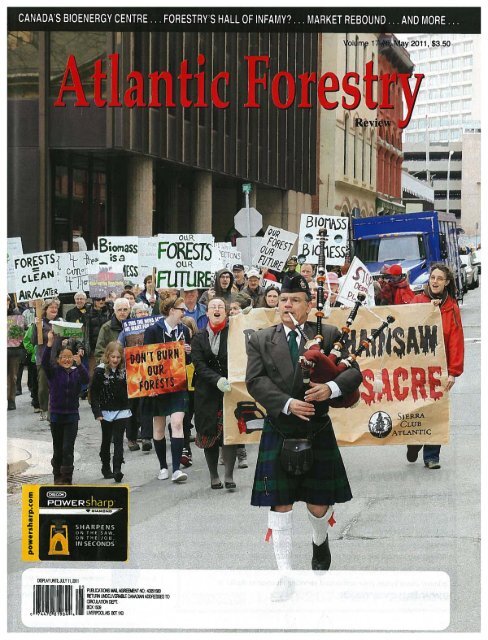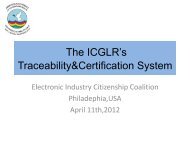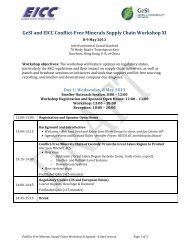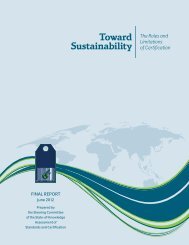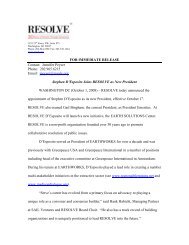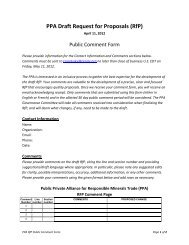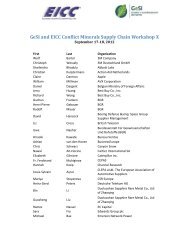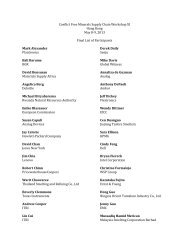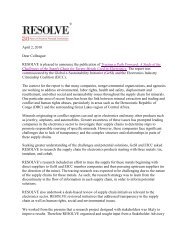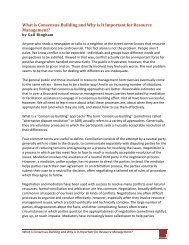Article | Atlantic Forestry Review
Article | Atlantic Forestry Review
Article | Atlantic Forestry Review
- No tags were found...
Create successful ePaper yourself
Turn your PDF publications into a flip-book with our unique Google optimized e-Paper software.
DISPlAYLMUlY 11, 2111III=~AGREEI.ENTOO; 4005151l)C1IUlATIJN DEPT CANAD1AN AIlIlAESSES TOOOX1!i19 .LNERPOOLNS IIJT lKD
Collaborative effortFSC standards on the table in Irving-initiated communication processby David LindsayThe ongoing debate over forestry inNew Brunswick has lately become moreopen and respectful than it was in yearspast Some are optimistic that this recentoutburst of civility may be habit-forming.Others believe the good manners will onlylastaslongasthere'sgoodfoodonthetable.The new phenomenon at play is ahighly structured and mediated exercise incommunication. It started with a series ofmeetings initiated by J.D. IrVing, Limitedin 2008, overseen by aprofessionalfacilitator.The company invited environmentaland conservation groups to take part, aswell as representatives from academia In aprocess that came to be known as the ForestCollaborative, participants discussed sus-tainability issues and identified potentialresearch areas of common interest.In 2010 the collective received a$978,000 federal grant through theCommunity-University Research Alliance(CURA) to keep the process going overa six-year funding period. In addition towell-worn themes related to the potentialpositive and negative impacts of forestmanagement, the partners agreed to workon what is known among the NGO crowdas "capacity building" - developing theskills and practices necessary to collaboratemore~ffectively.Theyalsopinpointedthe shared objective of increasing the acreageof New Brunswick forest certified bythe Forest SteWardship Council (FSC).There's some history surrounding thisone. In 1998 Irving achieved FSC certificationfor its 470,OOO-acre Black Brookfreehold woodlands in New Brunswick,but the next yearFSC endorsed a Maritimeregional standardthatwas more stringent insome respects, and the company cancelledits certification.Irving representatives made no secretof their dissatisfaction with the processthat resulted in a Maritime standard that isdifferent from the stapdard that applies totheir570,OOO acres ofFSC-certifiedland inMaine. Now this process is up for debateonce again, because the Maritime standard,which was last accredited in 2008, willbe due for a mandatory five-year reviewin 2013. FSC requires that consultationwith stakeholders occur as part of the,I~ !(•I'"FOrt Edward, N.Y.Toronto, OntarioMaine"* DixfieldMAY 2011ATLANTIC FORESTRY REVIEWPAGE 19
The CoUaborative Research Partnership for Sustainable Forest Management evolved fromthe ForestCoUabOrative In 2010, thanks to funding from the federal Community - UniversityResearch Alliances (CURA) program. Pictured at the funding announcement are (back row,left to right): Roberta Clowater, executive director of the Canadian Parks and WildernessSociety - N.B. Chapter; Blake Brundson, chief forester for J.D. irving, Limited; DonaldFloyd, Interim dean of the faculty of forestry and environmental management at UNB inFredericton; and (front row): Greg Kealey, UNB Provost and vice president (Research);Keith Ashftied, MP for Fredericton and minister of national revenue; and Fred Morley,executive vice president and chief economist, Greater Halifax Partnership, and SSHRCCouncil member.(David Lindsay photo)review, and the Forest Collaborative hasoffered to playa role, since it already hasa mechanism in place.CONFLICT RESOLUTIONThe facilitator who has acted as theneutral party. in the Forest Collaborative isJuliana Birkhoff, with a conftictresolutionorganization called RESOL VB, an NGObased in Washington,D.C., that specializesin mediating disputes related to naturalresources and environmental issues.It was Patrick Lacroix, Irving's governmentrehitionsdirector, who originallyinvited Birkhoff to New Brunswick tomeet with company representatives andconsider getting involved. But Birkhoffmakes it clear she was not taking ordersfrom Irving."I have never, never worked for JDI.I work for the Forest Collaborative," shesays. "I absolutely won't work on anythingthat belongs to someone. They have neverowned it. They said, 'We will support itfor four or five meetings and see if wecan get something going that is beneficialto the company.' They paid for my timefor the first four meetings and they paidmy travel after that, and my organizationdonated my time for a year after that."In addition to her skills and experienceas a mediator, what Birkhoff_ brought tothe table was objectivity. "I'm Canadian,so I know about the issues, but it helps tobe from outside so it's clear that I don'thave a dog in the fight," she says."I think it was helpful because peoplehad gone through several conversationsthat were difficult and a little bit of steppingon each other's toes, and so there wassomebody who could ensure there wouldbe ground rules and the rules would be followed,and somebody setting an agenda."Birkhoff could continue in this capacityfor the duration of the CURA fundingperiod, but she points out, ''The goal isto grow collaborative skills here so thatI would be working myself out of a job.My organization, this is what we've donefor 35 years. We are not interested in fullemployment, we are interested in workingourselves out. I could be gone by 2013.We have people who are beginning to dothis work here."CERTIFICATIONOnce the various Forest Collaborativeparticipants were on board and the fundingwas secured, a list of priorities was drawnup. Certification emerged as a key issuebecauseFSC is widely recognized as akindof shorthand for deriving the most social,economic, and environmental benefitsfrom the forest, Birkhoff recalls."So they said, 'Let's try to have agoal of having more FSC forests in New, Brunswick.' The 'more' could be byhaving Irving meet the current standard,or by changing the standard. We're goingto pursue the question and learn aboutboth alternatives, and learn what the bestpractices in forest management tell us."Birkhoff does not necessarily see thisas a conversation that will come down toa series of trade-offs. The collaborativeprocess, as she describes it, is more aboutseeing the issues in anew light, andexpandingthe common ground. "It's important tonote that the people who are participatinghaven 'tchanged their environmental goalsor their economic sustainability goals, butthey're trying to see if we can achievemore. Can we make a bigger pie insteadof dividing the pie up?"On March 24 the Forest Collaborativehosted a workshop in Sackville, N.B.,bringing in forest industry, environmental,and government representatives from theother Maritime provinces to take part in abroader discussion aboutFSC certificationin the region. Birkhoff says it was just apreliminary step in gathering input on howthe standard review consultation shouldbe conducted."It takes a lot of organization. Theremight be research questions, and it wouldbe better to start the research now so by2013 you have that infonnation. Any recommendationson process will go to FSC,and it's their responsibility to organize theprocess."PROTECTED AREASOn the conservation front, the ForestCollaborative includes representativesfrom Bird Studies Canada, the NatureConservancy of Canada, and the NatureTrust of New Brunswick. Another activeparticipant has been the New Brunswickchapter of the Canadian Parks and WildernessSociety (CPAWS), represented bythe group's executive director, RobertaClowater. With its singular focus on protectedareas, CPA WS saw the potentialto gain some ground by being part of theprocess.''For one thing, Irving owns a lot ofland," says Clowater. "We felt there wasroom for us to discuss with them waysthey could better conserve ecosystemson the land that they have, and for themto better understand the interests we haveon the Crown land they manage as well.Right now we have a committee thatPAGE 20/ATLANTIC FORESTRY REVIEW MAY 2011
The other part of that discussion, ofcourse, is how Irving can further the landprotection objectives of CPA WS andlike-minded conservation groups. Thecompany has jts own voluntary UniqueAreas Program, under which it has setaside 164 New Brunswick Crown landsites totaling 75,600 acres and 450 sitestotaIing84,OOOacresonitsfreeholdlandinthe province, plus 19,900 acres of privateland designated as scientific reserves.Keith says data on these sites has beensharedwithaForestCollaborativeworkinggroup that includes the conservation organizationsas well as UNB and governmentrepresentatives. But again, she declines toget into specifics about the potential fordeal making.CHAMBERSMaia Becker, vice president of FSCCanada, says whatever the Forest CollaborativecontrIbutes, it won't changeFSC's standard revision process, wherebyrepresentatives are appointed from thesocial, environmental, economic, andAboriginal Peoples chambers.''The board of directors would belooking for a balance from the fourchambers, but also a regional balance,and also an expertise balance," she says."We encourage local groups to bring differentinterests together, but FSC wouldwant to be verifying and ensuring that allstakeholders are being ' represented andhave been consulted."This broad approach accounts for thefact that standards may vary across jurisdictions,even within the same forest type.As for the restrictiveness of the Maritimestandard, Becker points out that it is currentlybeing met on 1.8 million acres ofFSC-certified land in the region.''The intention ofFSC' s forestmanagementstandards is not to make it overlyonerous," she says.The Conservation Council of NewBrunswick (CCNB) is one of the significantenvironmental voices that will likelymake itself heard during the standardrevision process, though it is not part ofthe Forest Collaborative."We went to the initial meeting hostedby the Irvings, we participated in the discussion,and there was nothing particularthat the Irvings wanted to collaborate onthat was relevant to what we're workingon," says David Coon, the group'sexecutive director. ''They mostly at thetime wanted to talk about protected areas,and we don't do that. The FSC stuff, thatwasn't explicit at the time."Some NGOs are members ofFSC, butthe CCNB is not, and Coon still sees thisas advantageous. "We dido 't join becausewe wanted to be in the position of offeringcommentary on the various certificationregimes that were being developed at thetime. Ifyou'repartofone of them you can'treally be objective, so we stayed outsideof it If you get inside the standard-settingbusiness it's difficult to take any view ofthe value of standards."(David Lindsay lives in Stanbume, N.S.Do you have any comments on this topic?If so, email dvlmail@eastlink.caand tellus what you think.) "'-


